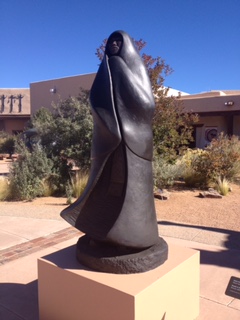 Since my summer practice is to be present, I cannot avoid being present to the pain and sorrow that come into my awareness. This week, my heart was broken first for the families of the two teenage girls from China, having sent their daughters off for an enriching and spiritually deepening experience in the United States, only to hear that they had been killed in a horrifying airplane crash at San Francisco International Airport. Here in Southern California a whole rural community has been traumatized by the five day search is scorching heat for a boy they believed to be at risk, only to have him found dead in his own backyard, possibly at the hands of a family member. Now we are watching those who are devastated by the verdict in the trial in Florida. And in my close circle, there are the ones who are in surgery, the ones in emergency, the ones waiting for diagnoses, the ones in grief, the ones who are in the throes of adjusting to a new reality after a terrible loss, those looking at the unknown.
Since my summer practice is to be present, I cannot avoid being present to the pain and sorrow that come into my awareness. This week, my heart was broken first for the families of the two teenage girls from China, having sent their daughters off for an enriching and spiritually deepening experience in the United States, only to hear that they had been killed in a horrifying airplane crash at San Francisco International Airport. Here in Southern California a whole rural community has been traumatized by the five day search is scorching heat for a boy they believed to be at risk, only to have him found dead in his own backyard, possibly at the hands of a family member. Now we are watching those who are devastated by the verdict in the trial in Florida. And in my close circle, there are the ones who are in surgery, the ones in emergency, the ones waiting for diagnoses, the ones in grief, the ones who are in the throes of adjusting to a new reality after a terrible loss, those looking at the unknown.
When sacred text enjoins us to “weep with those who weep,” I have wondered this week what that being present to that pain means in my context. I am being taught both by reading and conversation, prayer and reflection, what it might mean and what it does not mean.
- What it does not mean is losing myself in the grief of another in such a way that it leads to my own paralysis and neglect of my own call.
- It does not mean assigning blame, coming up with a reason, raging pointlessly against forces beyond my control.
- It does not mean offering platitudes or “right answers” just because I have learned them from my education or mentors, or even my own experience.
- It does not mean losing heart and faith even in the face of unimaginable disappointment or lack of a clear direction toward hope.
- What it does mean is a having a heart open to be a witness to the pain of another, and not putting my head in the sand. It means entering into the heart of the compassionate Christ, who came alongside and healed the marginal, the broken, those who had no power to participate in their own healing.
- It means suspending judgement and analysis, rather to be willing to hear, to observe, to pray and to hold on to my own anchors of faith, even if the sighs are too deep for words.
- It does mean continuing to offer prayers for healing, for peace, for redemption; I can pray for the presence of the Holy One to come alongside the one who is suffering.
- It means to discern any action and word that I can bring to the one who is suffering, and be willing to deliver it, letting go of any need for appreciation, thanks or sense of success.
In the mysterious ways the Spirit moves through life and the world, my own body has been in pain this week, and I am embarked on a path toward healing in the days ahead. This turn of events has made the sorrow of the world even more palpable. I have let go of comparisons; the grief and suffering of each person and community belongs to them. I am seeking in prayer to let go of condemnation and blame, and the “if onlys.” I am clinging to what I know for sure about the Love of God which will not let me go, and presence of the love of the community which is more imaginative and mysterious than I can fathom, and to hold myself up to the Light which no darkness can put out.
I am present to pain this week, my own and the pain of the world. I am taught by Edith Stein, Carmelite nun, about whom Dorothee Soelle writs in her stunning book, The Silent Cry. Stein says “…it is not human suffering that can help us, but Christ’s suffering. To take part in it is what I desire.” (147) I am not where Stein was, but I am willing to be made willing.











